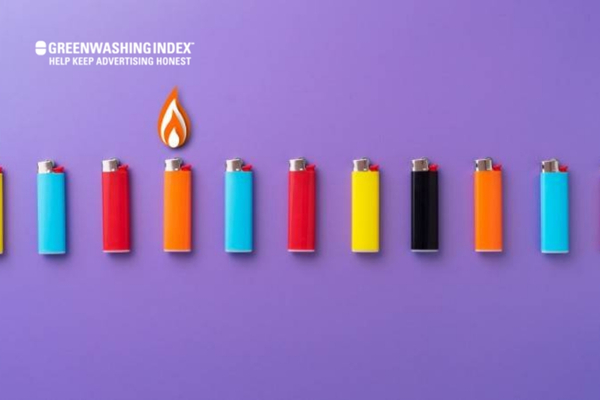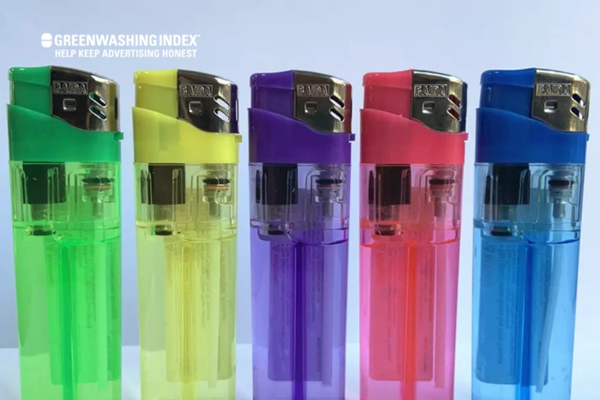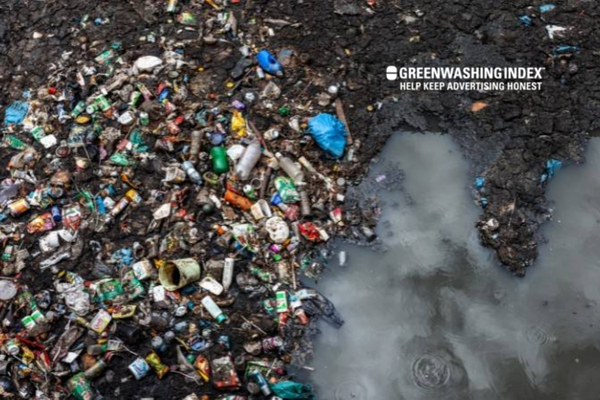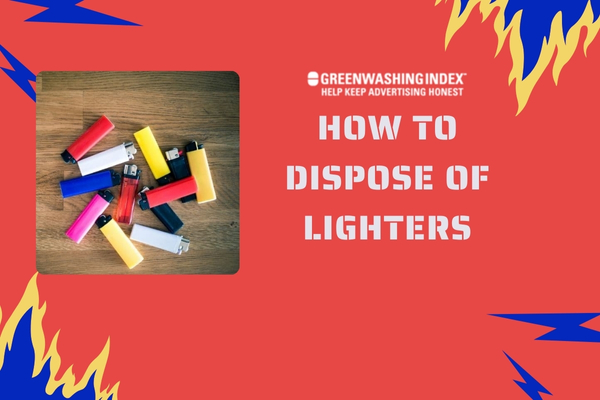Ever wondered how to dispose of lighters without harming Mother Earth? If so, you’re in the right place. Picture this: you’ve just used the last flick of your lighter, and it’s served its purpose.
What now? Toss it in the bin and forget about it? Nope! That tiny tool could cause more trouble than expected. It’s not just about getting rid of an item; it’s about doing it thoughtfully. So stick around because I’ve got some insights that are too hot to handle!
So, how should you really say goodbye to old lighters? Lighter waste is a big issue for our environment – but don’t stress! I’m here to shed some light on dump-friendly ways that help our planet breathe easier.
From disposable chunky plastic ones to fancy refillable metals, I’ll walk you through how each type can be tossed out safely and sustainably. Because let’s face it, we all want a clean home without any backup from trash blunders.
Can You Recycle Lighters?
Have you ever wondered how to dispose of lighters the right way? Maybe you’ve thought about recycling them. Let me tell you, it’s not as simple as tossing them into your blue bin with the newspapers and bottles.
Lighters are tricky to recycle. Why is that? Here’s what I’ve learned:
- Materials: First off, lighters are made from different materials. They’ve got plastic, metal, and sometimes even a bit of cloth for the wick if they’re old-school. These materials stuck together to make it hard to separate and recycle.
- Hazardous: Another big problem is that lighters could be dangerous. They’re not just chunks of plastic; they have fuel inside and could explode if they’re crushed or heated up by accident.
- Small Parts: Lighters are small. Tiny things often get missed or ignored in big recycling plants because it takes a lot of work to sort them out from everything else.
- Local Rules: Where I live, rules on recycling can be very strict or particular about what goes in those bins.
Most curbside programs won’t take lighters because:
- They need to protect their workers from the risk of fire or explosion.
- It costs too much time (and money) to break down something as small and complex as a lighter.
Finding Specialized Recycling Solutions
Even though everyday recycling won’t take your old lighters, there might be other ways to recycle them:
- Mail-In Programs: Certain companies might let you send in stuff like lighters, especially for disposal or recycling. For example:
- Find a brand that makes lighters. Some brands have their own return programs for used-up products.
- Search online. Websites list mail-back services where they handle hard-to-recycle things – maybe even including those pesky lighters. For those who want a step-by-step guide on the safe disposal of lighters, this comprehensive guide provides additional tips and methods to ensure you’re doing it right.
- Drop-off Centers: In some places, there are centers where you can bring hazardous waste – maybe they’ll accept your used-up lighter there.
Here’s what you might do:
- Go online and search for local hazardous waste drop-off spots close to where you live.
- Give them a call or check their website first before going over – no point in wasting a trip!
Remember: Each place has its own rules about what kind of stuff it takes back.
When handling things like disposing of lighters responsibly, we’ve got to remember that every little effort adds up when we’re talking about taking care of our planet!
When it’s time to say goodbye to an old lighter, I know it’s not as simple as just tossing it into the trash. Disposing of lighters the right way matters for safety and for our planet. So, let’s talk about how to dispose of lighters safely and sustainably.
Also Read: Mattress Disposal: Easy Steps for Eco-Friendly Solutions
Proper Disposal Methods for Different Types of Lighters
First off, there are many kinds of lighters out there – from plastic disposables to fancy butane ones. Each type needs special care when you’re ready to throw it away.

Safety First: Preparing Lighters for Disposal
Before we toss any lighter, we must make sure they’re safe. Here’s what I do:
- For disposable lighters: I make sure they’re empty. I do this by holding down the fuel-release button until nothing comes out – no sound, no fuel spray.
- For refillable butane lighters: These guys can be trickier. Even when they seem empty, there could still be some gas lurking inside. To play safe, I adjust the flame setting to its lowest and expel any remaining gas by pressing the refill valve with a screwdriver until nothing is left.
- For electric or rechargeable lighters: These don’t have fuel like others, but we still want to handle them carefully. I ensure they’re fully discharged (no battery power left) before disposal.
Remember kids and pets? Keep them far away when you’re emptying or handling old lighters!
Earth-Friendly Options for Disposable Lighter Discarding
Most disposable lighters end up in landfills if thrown out with regular trash – that’s not great for Mother Earth. But here’s how I try to be earth-friendly:
- Recycling: Where available, recycling programs may take these bad boys apart safely and recycle some parts.
- Hazardous Waste Programs: Some places have special drop-off spots for items that can cause harm if tossed wrong — like disposable lighters.
Following these steps on how to dispose of lighters safely and thoughtfully reflecting on our choices and actions surrounding waste management can indeed ignite sustainable practices!
Also Read: Washer and Dryer Disposal: Eco-friendly Methods Revealed!
How to Dispose of Lighters: Beyond Trash Bins
When I think about throwing away used items, I try to do it the right way. You might not give much thought to how to dispose of lighters, but it’s more important than you might realize.

The Perils of Improper Disposal
Disposing of lighters in the wrong way can cause big problems. Lighters are small, but they pack a punch when it comes to environmental harm.
- Plastic Pollution: Most lighters are made from plastic. When thrown away, they can end up in landfills or oceans, adding to the massive plastic waste issue.
- Chemical Leaks: Inside a lighter, there is lighter fluid. This fluid is harmful and can leak into soil and water, hurting plants and animals.
- Fire Hazard: Lighters may still create a spark even when they seem empty or broken. If not thrown out carefully, they could start fires in trash cans or garbage dumps.
It’s clear that we should take extra care when it comes time to toss these tiny tools out.
Identifying Your Lighter Type
Before you throw your lighter away, you need to know what kind you have. Here are three common types:
- Disposable Lighters: These are often cheap and meant for one-time use. Once the fuel runs out, you can’t refill them.
- Look: They typically have a plastic body and no refill valve.
- Feel: Lightweight due to their mostly plastic build.
- Refillable Lighters: These lighters are designed for long-term use, as you can refill them once they run dry.
- Look: They usually have higher-quality materials like metal and a valve or port for refueling at the bottom.
- Feel: Heavier and sturdier than disposable ones due to better construction and materials.
- Specialty Lighters: These could be torches used for specific tasks like starting a BBQ or soldering metals.
- Look: They come with unique design features suited for their specific use—often larger with extended nozzles or adjustable flames.
- Feel: Can vary widely based on purpose but generally have solid construction tailored towards frequent use.
Each type needs its own disposal method because each one has different parts that could be bad for our planet if tossed incorrectly.
Knowing about these types helps me choose the best way how to dispose of lighters without causing trouble for our environment or putting people at risk with potential fires. Next time, before tossing your used lighter into the nearest bin, check what kind of lighter it is—it’s an easy step toward taking better care of our world!
Also Read: Old Electronics Disposal: Ultimate Recycling Tips Guide
The Environmental Impacts of Lighter Waste
Disposing of lighters the wrong way can hurt our planet in ways people might not think about every day. When I talk about how to dispose of lighters, it’s important to look at what happens if we ignore the problem.

Pollutants Below Our Feet & In Our Waters
Most lighters are made of plastic and metal. When these get thrown away carelessly, they don’t just disappear. Instead, they start to break down in places like landfills but never fully go away.
Here’s what happens:
- The chemicals from the lighter fluid can leak into the soil. This is bad for the earth because it makes it harder for plants to grow, and these chemicals can also get washed away by rain.
- If lighter waste gets into rivers or seas, these pollutants harm our water. Imagine turning on your tap and the water is dirty because of things that shouldn’t be there – that’s what could happen over time.
- Fish and other creatures that live in water may drink or breathe in these harmful bits from old lighters, which messes with their health and ability to survive.
When I think about disposing of lighter waste properly, it’s clear why looking after our land and water is key.
When Wildlife Suffers Because of Our Waste
Animals don’t know what a lighter is; they might think it’s food or part of their home. Here’s how improper disposal hurts them:
- Small animals could swallow bits of broken lighters, thinking they’re eating something tasty when, really, it could make them sick.
- Birds sometimes pick up colorful plastic pieces to build their nests without knowing they’re dangerous.
Mismanaged lighter waste doesn’t just pollute; it can literally tear down homes for wildlife or become a deadly meal for an unsuspecting animal. That is why learning how to dispose of lighters properly matters so much – not just for us but for all living things around us.
Also Read: Computer Recycling: Green Guide to Old Tech Disposal
Journey Towards Sustainable Fire-Lighting Practices
As someone who cares about our planet, I want to share some thoughts on how to make better choices when it comes to fire lighting. We all know that lighters are handy. But did you ever stop to think about what happens when we throw them away? That’s right, they can harm the environment. So, I’ve been looking into how to dispose of lighters responsibly and even found better alternatives.
Match Your Way To Eco-Friendliness
Instead of reaching for a traditional lighter, consider using matches. Why? They’re made from wood or cardboard, which come from trees, and are much kinder to Mother Earth. The great thing about matches is they don’t stick around causing trouble long after we’re done with them. Let me tell you why:
- First off, matches break down naturally in the environment. That means once used, they go back into the soil without leaving any nasty stuff behind.
- Wood is renewable. Trees grow back! And if managed well, match production can keep rolling without damaging forests.
- Using matches also means no plastic or metal waste because most of their packaging is cardboard, too.
So, next time you need a little flame for your birthday candles or start a cozy campfire, reach for a box of matches instead!
Next-Gen Lighting Up – Electric Arcs & Solar Sparks
Now, let’s talk futuristic firefighting! There are some really cool inventions out there that can spark up your life in an eco-friendly way.
Electric/Plasma Lighters
Firstly, have you heard of electric or plasma lighters? These gadgets don’t need fuel like traditional lighters:
- They work by creating a tiny electric arc between two points.
- You charge them up just like your phone.
- No gas means no harmful chemicals are released.
What I love about these modern marvels is that they’re super efficient and last ages on one charge!
Solar Lighting Solutions
Another bright idea is solar lighting tools:
- These amazing devices use the sun’s power to create fire.
- There’s no need for any fuel at all – talk about free energy!
Both electric/plasma lighters and solar solutions mean way less trash because you’re not throwing away lighter after lighter. They might cost more at first, but over time, they pay off — for both your wallet and planet Earth!
Helping our planet starts with small steps like changing how we light fires. Whether it’s going old school with simple matches or embracing next-gen technology with an electric spark or sunny beam — every little action counts towards igniting sustainable practices!
FAQs
Why can’t I throw away my used disposable lighter with regular trash?
Throwing lighters with regular trash is unsafe. They contain flammable fuel and chemicals that can harm the environment and pose a fire risk in landfills.
What should I do if there are no dedicated recycling options available in my area?
If recycling options for lighters are limited, you should safely use up the lighter’s fuel and dispose of it as hazardous waste through your local facility.
How do rechargeable electric or plasma lighters contribute to sustainability?
Rechargeable lighters reduce waste because they’re long-lasting compared to disposable ones. They don’t need fuel refills or create plastic trash, making them a more eco-friendly choice.
Conclusion
Figuring out how to dispose of lighters responsibly might seem tricky, but it is critical. Through the insights I’ve shared, we’re now equipped with knowledge on sustainable disposal and alternatives. The choice is ours to make a difference, one lighter at a time.
Key Takeaway Points
- Most recycling programs cannot take lighters due to safety risks.
- Specialized facilities do exist for recycling lighters.
- Always ensure lighters are fully used, and safety measures are taken before disposal.
- Disposable lighter disposal requires eco-aware practices.
- Improper disposal of lighters poses serious environmental threats.
- Recognizing your lighter type aids in determining the correct way to dispose of them.
- Lighter waste has adverse impacts on soil quality, water bodies, and wildlife.
- Matches and next-generation alternatives like electric or solar lighters offer environmentally friendly fire-lighting options.



